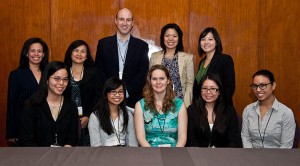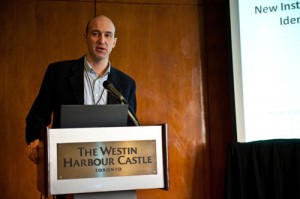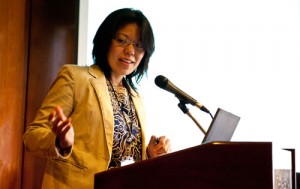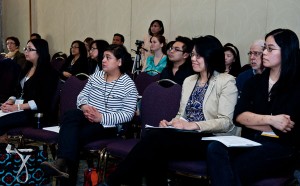Fil-Can Youths not doing as well as parents
Fil-Can Youths not doing as well as parents

YORK U/CASJ research participants in the Filipino Youth Transitions in Caanda (FYTiC) project presented at the 14th National Metropolis Conference. From left, back row, Josephine Eric (Hamilton), Mila Astorga-Garcia (CASJ), Philip Kelly (York U), Darlene Bautista (Winnipeg), Jeanette Chua (U of T); from left, front, Daisydee Bautista (ANAK-Winnipeg), Maureen Mendoza (UBC), Julia Mais (York U), Veronica Javier (York U), and Conely de Leon (York U).
TORONTO — Youth are not doing as well as their parents’ generation when it comes to education and employment levels, says a panel of speakers at the Metropolis Conference on Friday (March 2, 2012).
Academics and community leaders from Toronto, Vancouver and Winnipeg presented their work about Filipino-Canadian youth at the conference. Using Statistics Canada data, researchers said Filipino-Canadian youth’s generation are less likely to attend university and have, on average, lower incomes than their parents’ generation.
Filipino-Canadians are the only major visible minority group that shows this downward trend.
“If you look at the Filipino community, it’s the one group where you see a downward movement from a very high level in the first generation to a lower level of degree ownership in the second generation,” said Prof. Philip Kelly of York University to the group of about 20 people who attended the workshop.
Kelly was presenting the work of the “Filipino Youth Transitions in Canada” (FYTiC) research project, a collaboration beetween York University and the Community Alliance for Social Justice (CASJ)
In the data presented from Statistics Canada, first generation Filipinos were shown to be highly educated. On average, they arrived in Canada before 1993 and were 45 years old. These are the “parents’ generation.”
The second and 1.5 generation of Filipino-Canadians, the youth, who were born here or arrived here before they were 13 years old, don’t have the same success rates in getting university degrees as their parents.
Filipino-Canadians are the only group among the major visible minority groups (Chinese, South Asian, Black and Latin America Canadians) that shows a downward mobility.
The results Kelly presented were from the Toronto Census Metropolitan Area. Similar results were shown for Vancouver for education levels, and income levels.
While Kelly emphasized that the economic factor was a major reason for the downward trend, for the conference workshop paper, he focused on the cultural factors such as: the work structure of parents, if grandparents are here, if the community is concentrated in one area, and if the youth have positive mentors.
In the question period, Kelly said that parents working in jobs that are lower paying or lesser status than their jobs in the Philippines (deprofessionalization) could be a major factor affecting these trends. Emigrating through the Live-in Caregiver Program and the effects of family separation could also be a big influencer. But, finding data to support reasons for youths’ poorer success rates is difficult.
In Winnipeg, there is an upward mobility over generations of Filipino-Canadians. But their success still lags behind other ethnic groups.
Maureen Mendoza presented her work at the University of British Columbia and she said there was no consensus among the interviewees about reasons for the high rate of high school dropouts in Vancouver. Some pointed to gang violence, others talked about a lack of money to attend post-secondary studies, and some had feelings of difference or “otherness” because of negative stereotypes of Filipinos working in service industries.
Darlyne Bautista talked about her work as an advocate and activist in Winnipeg, and more recently as a trustee in the Winnipeg School District. She and her sister, Daisydee Bautista, work with Filipino youth in an organization called ANAK. ANAK’s work includes mentorships, which gives academic and acculturation support to newcomer youth, while the mentors themselves, mostly second generation youth, reconnect with their heritage.
During Kelly’s presentation, he highlighted the work of organizations that have become venues for youth cultural expression as they “redefine what it means to be a Filipino-Canadian.” Kapisanan Centre for Arts and Culture in Kensington Market was one of the groups, the two others being ANAK of Winnipeg, and Tulayan of Vancouver.
At the Metropolis workshop, Julia Mais of York University presented. Conely de Leon also of York University discussed the research, and Mila Astorga-Garcia of the Community Alliance for Social Justice chaired the event.
The 14th National Metropolis Conference was held at the Westin Harbour Castle on Queen’s Quay. The four-day conference focused on immigration issues and was attended by over one thousand researchers, academics, policy-makers and community workers.
The FYTiC research project is still ongoing and we are calling on more Filipino-Canadian youth to participate in the sruvey and focus groups. This research is important to the Filipino-Caandian community as it could pave the way towards reversing the downward trend in education and employment income performance anong our youth. For this reason, it is also important to all Filipino-Canadian groups who would like to have a better furture for our youth. If you would like to help toward the success of this research project, please contact Veronica Javier, FYTiC Research Assistant (416-805-3806), or Mila Astorga-Garcia , CASJ Director for Research (416-803-8576).
—————
Help out in the research on why Fil-Can youth don’t perform well in education and employment
The FYTiC research project is still ongoing and we are calling on more Filipino-Canadian youth to participate in the suvey and focus groups. This research is important to the Filipino-Canadian community as it could pave the way towards reversing the downward trend in education and employment income performance among our youth. For this reason, it is also important to all Filipino-Canadian groups who would like to have a better future for our youth. If you want to help toward the success of this research project, please contact Veronica Javier, FYTiC Research Assistant (416-805-3806), or Mithi Esguerra, CASJ Research Committee (647-239-6553).



Comments (2)